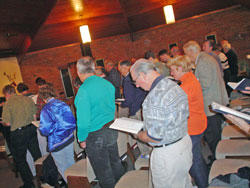Faithful seek Christian response to Iraq war

By PAUL STORER
LOMBARD—Based on extensive research into the ancient Christian rationale for war, known as the just war theory, the Rev. Calvin Morris of Chicago asserted, “I don’t see how the (U. S.-led war in Iraq) fits into the just war model.” During his formal remarks, the renowned historian, human rights advocate and ordained Methodist minister attempted to shed light upon the theory.
Nearly 70 people from various DuPage County faith denominations gathered Oct. 7 at Lombard Mennonite Church for the first program of four consecutive Friday evening peace talks, dubbed “A Christian Response to the War in Iraq.” Looking out upon the people gathered, Rev. Morris said, “War brings out the worst in us.”
Associate pastor of Galewood Community United Methodist Church in Chicago, the 64-year-old minister explained that St. Thomas Aquinas conceived the notion of a just war in the 1200s. He noted that the saint’s early model presented justifications for war as well as combat measures permitted during armed conflicts. The ideas have been mulled over and expanded upon by historians and theologians for centuries, he said. “I find it fascinating,” added the current executive director of the Chicago-based Community Renewal Society, a social outreach organization.
Looking over his research, the longtime peace advocate and demonstrator who worked hand-in-hand with the Rev. Martin Luther King Jr. described the standard just war components. “There has to be a reason for the struggle,” he said. In order to fit the theory, combatants in a war must be defending themselves or protecting others, he explained. Acknowledging allegations of Saddam Hussein’s mistreatment of Iraqis, Rev. Morris noted that many political leaders around the world have been known to abuse and neglect their people. “We certainly didn’t go to war with them.”
According to the theory, pre-emptive strikes in Iraq were unwarranted because Iraqi soldiers didn’t actually attack the United States, he asserted. Meanwhile, “no weapons of mass destruction were found.
“The pre-emptive strike concept is so dangerous.” This notion “asserts that” leaders around the world could seemingly engage in military ventures against others based on “feelings” and “assumptions,” Rev. Morris added.
Another criteria for waging a just war is receiving legitimate authorization, stated Rev. Morris. “Nobody can start a war. You must have right authority,” he said. Members of the U.S. Congress authorized combat measures, but “other than that their was no” international approval, he said. Representatives from the United Nations balked at the proposal, he added.
In the meantime, “All options were not exhausted,” said Rev. Morris. Based on the just war principles, negotiation and diplomatic measures are required to the fullest extent before leaders can deploy troops. “Just war theory states that war should be a last resort,” he said.
The premise also states that leaders must be sure of success with minimal loss of human lives, especially “women and children,” Rev. Morris said. “It’s rare that warfare doesn’t leave destruction in its wake,” he said, noting that nearly 30,000 soldiers and civilians have died since the war began in 2002.
“Proportionality” between the kinds of available weaponry of the combatants is also required based on the just war philosophy, explained Rev. Morris. “There should be no more force than necessary.” He speculated that various U.S. leaders agreed about military action in Iraq based primarily on the fact that the country’s military weapons and troops were perceived as inferior to American technology and forces.
“Just war theory assumes a just outcome,” said Rev. Morris. There must “be more good” and “less violence” as results of the conflict, he concluded.
Addressing the congregants at the start of the program, the Rev. Todd Friesen, lead pastor of the Lombard Mennonite Church, stated, “This is the 934th day of the Iraq war,” Approximately 2,000 American soldiers and 26,000 Iraqi civilians have perished since U.S. troops in 2002 arrived in the region, he noted. The leader of the Mennonite congregation, which is recognized for pacifism, added the U.S. government has spent about $300 billion for war equipment and materials.
Briefly countering some ideas and principles of the just war theory, Richard Kaufman, senior editor of Chicago-based Christian Century magazine and member of Lombard Mennonite Church, discussed the notion of pacifism with the people gathered in the worship space. Declaring himself a “pacifist,” the speaker questioned the guarantee of success as a stipulation to justify the theory. “How can you guarantee that? War is unpredictable,” he said.
Following his presentation, Kaufman suggested that if proponents of the just war theory totally followed each guideline of the philosophy “there would be so many less wars.”
A visitor to the church, Bill Berends of Lombard speculated that the war in Iraq would have undoubtedly been deemed a just war if military forces had found weapons of mass destruction.
“We’re against the war in Iraq,” said School Sister of Notre Dame Mary Lou Henderson, a member of the West Suburban Faith-based Peace Coalition. The ministry of care coordinator at St. Alexander Parish in Villa Park mentioned that the late Pope John Paul II along with other religious and secular leaders around the globe voiced opposition to the U.S.-led armed conflict in Iraq. “I’m horrified that someone would go to war in the name of our creator.”
Along with the Mennonite Church, the ecumenical program was co-sponsored by Pax Christi of Illinois, members of the WSFPC as well as peace champions from a variety of anti-war organizations from throughout the Chicago suburban area.
Link Here




0 Comments:
Post a Comment
<< Home